Programas de transferencias monetarias sectoriales
Los PTM pueden ayudar a las personas en situaciones de crisis a abordar sus necesidades dentro de un determinado sector humanitario, tales como: agua, alimentos, salud, vivienda, medios de vida, o protección. Los PTM sectoriales pueden ser restringidos o sin restricción, condicionales o incondicionales, y normalmente serán proporcionados como parte de un paquete integral que puede incluir asistencia en especie o servicios.
Cada sector tiene que considerar distintas preguntas, retos, ventajas y riesgos cuando se trata de apoyar la recuperación de las personas dentro de su área de especialización. Esto requiere evidencias, herramientas, orientación y capacidad. Para cumplir los resultados sectoriales a través de los PTM también se requiere de una comprensión multisectorial de las necesidades y de la seguridad económica de los hogares (vea las Transferencias monetarias multipropósito). Mientras que algunos sectores tienen mucha experiencia en la implementación de los PTM y lo han hecho por muchos años, otros se están poniendo al día. La mayoría de los sectores humanitarios están comprometidos y han venido aumentando sus esfuerzos en los PTM sectoriales. El Grupo global de coordinación de clusters (GCCG, por sus siglas en inglés) también se encuentra coordinando el trabajo entre clusters para mejorar la utilización sectorial de los PTM.
Prioridades actuales
La CALP Network trabaja en estrecha colaboración con los grupos técnicos de asistencia en efectivo y equipos de tareas dentro de los clusters globales, que han estado definiendo sus prioridades y planes de trabajo del 2020 durante sus reuniones regulares. Una descripción general y detalles específicos de estas prioridades en cada cluster global está disponible aquí.
Subpáginas de los PTM sectoriales
-
Coordinación y gestión de campamentos y programas de transferencias monetarias
-
Educación y programas de transferencias monetarias
-
Seguridad alimentaria y programas de transferencias monetarias
-
Salud y programas de transferencias monetarias
-
Nutrición y programas de transferencias monetarias
-
Protección y programas de transferencias monetarias
-
Alojamiento y programas de transferencias monetarias
-
Agua, saneamiento e higiene (WASH) y programas de transferencias monetarias
Contenido destacado
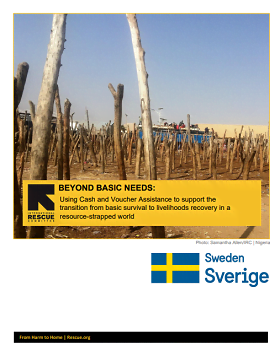
Beyond Basic Needs: Using Cash and Voucher Assistance to Support the Transition from Basic Survival to Livelihoods Recovery in a Resource-Strapped World
Guidelines and Tools
Do you think of yourself as a “cash” person OR as a “livelihoods” person? An “emergency” practitioner OR a “recovery” practitioner? Or do you find yourself unsatisfied with the often narrow implications of these terms? We’ll never have enough funding to provide basic needs support to everyone who needs it for the entire time they are in need, even if we take advantage of the...

Looking into 2020: short overview on global clusters, CVA and the CALP Network
Presentation
Overview as 2020 begins:
• Significant progress and commitment from all global clusters on integration of CVA into their work.
• Significant interest in different regions and by some donors on sector-specific CVA.
• Challenges that remain:
o Dialogue: 1) Ensuring CVA specialists understand sector specificities and successfully bank on the technical expertise emanating...

Building Evidence to inform the Effective Use of CASH and Voucher Assistance in Emergency Sanitation and Hygiene Programming
Report
An analysis of 5 case studies of utilization of CASH/Voucher Assistance are presented and analysed in the attempt of building evidence on their utilization in emergency WASH Sanitation and HP programming. Findings and recommendations are provided on Coordination, Situation and Response Analysis, Program Design, Implementation, Monitoring and Evaluation.
Últimos recursos
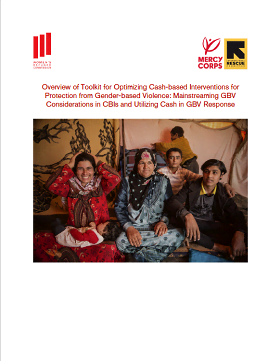
Toolkit for Optimizing Cash-based Interventions for Protection from Gender-based Violence
Guidelines and Tools
Efforts to prevent and respond to GBV should be a priority for all actors in all humanitarian response operations from the very start. By mainstreaming GBV considerations in CBIs throughout the program cycle and by utilizing cash within GBV case management services, cash can be optimized as a tool to...

Review of Food for Peace Market-Based Emergency Food Assistance Programs: Democratic Republic of Congo Case Study Report
Report
The Democratic Republic of Congo (DRC) case illustrates the complexity and diversity of contexts within which program design and implementation occurs. It highlights the need for provincial-scale assessments, local market monitoring, and flexibility to pivot to different modalities depending on changing...

Understanding Market Drivers in Syria
Report
Study conducted by the SIM Consortium (Syria Independent Monitoring) in partnership with iMMAP, commissioned by DFID (report initially released in January 2018). This report documents the findings of an in-depth assessment of the olive/olive oil and spice/herb market systems in northeastern and...
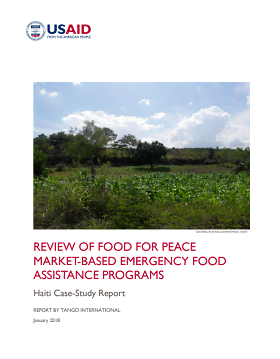
Review of Food for Peace Market-Based Emergency Food Assistance Programs: Haiti Case-Study Report
Report
Haiti is a very low-income country with a degraded ecological setting that faces repeated threats from multiple hazards. It is an excellent example of Food for Peace (FFP) linking emergency and development funding through the Kore Lavi Title II program that serves as a model for the national social...
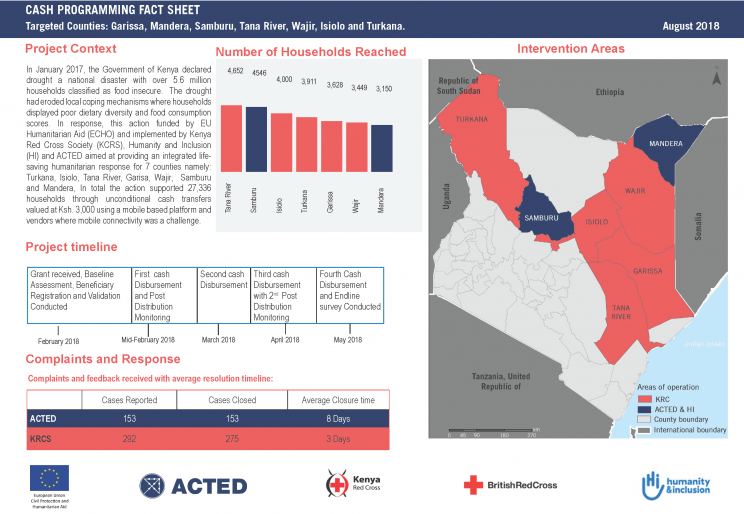
Cash Programming Fact Sheet
Report
A cash programming fact sheet demonstrating cash intervention in Kenya funded by EU Humanitarian Aid (ECHO). The program objective was to increase access to humanitarian assistance for vulnerable and drought-affected populations in the ASAL counties of Kenya.
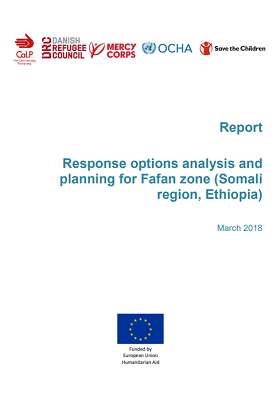
Response options analysis and planning for Fafan zone (Somali region, Ethiopia)
Guidelines and Tools
Between October 2017 and March 2018, the Consortium began the pilot in Ethiopia with the aim of providing technical and strategic support to country-based humanitarian organisations, enabling them to engage in collaborative assessments and decision making. Whilst the Consortium has not been conceived to...

Addressing food insecurity: Does the choice of transfer modality matter?
Report
This operational study analyses the impact of multipurpose cash (MPC)—associated with a nutrition-sensitive training—on the food security and nutrition of the households affected by the drought in the Salvadoran Dry Corridor. Three quantitative and qualitative surveys—with a strong gender...
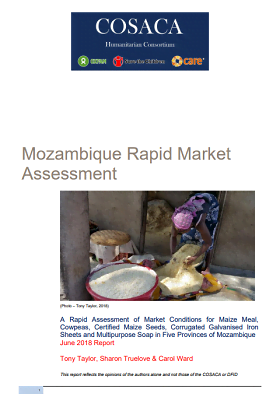
Mozambique Rapid Market Assessment
Report
Mozambique is a country prone to natural disasters, most markedly floods, cyclones, pest and disease outbreaks and frequent droughts. These regularly exacerbate the underlying poverty and food security situation and cause major damage and set back economic growth in disaster-affected areas. Meteorological...

The Role of Cash Transfers in Social Protection, Humanitarian Response and Shock-Responsive Social Protection
Guidelines and Tools
Cash transfers have expanded rapidly in low- and middle-income countries (LMICs) around the world in the past decade. The contexts in which they are implemented have also diversified; while cash transfers were mostly adopted initially as central elements of social protection systems, they have become...

The 1.5 Billion People Question : Food, Vouchers, or Cash Transfers?
Report
Most of the people in low and middle-income countries covered by social protection receive assistance in the form of in-kind food. The origin of such support is rooted in countries’ historical pursuit of three interconnected objectives, namely attaining self-sufficiency in food, managing domestic food...

E-Transfer implementation guide
Guidelines and Tools
This updated E-transfer Implementation Guide replaces the original guide published in 2014. In cash transfer programming (CTP), electronic transfers (e-transfers) are a digital replacement for paper vouchers or physical cash. E-transfers are a disbursement mechanism – a way of transferring money, goods...
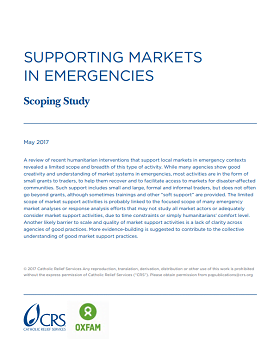
Supporting markets in emergencies. Scoping study
Report
A review of recent humanitarian interventions that support local markets in emergency contexts revealed a limited scope and breadth of this type of activity. While many agencies show good creativity and understanding of market systems in emergencies, most activities are in the form of small grants to...
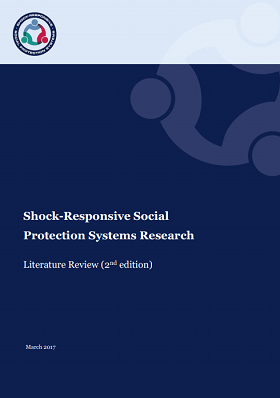
Shock-Responsive Social Protection Systems Research: Literature Review (2nd Edition)
Report
DFID has commissioned research into Shock-Responsive Social Protection systems, to further understand the nature of the interaction between social protection, humanitarian and disaster risk management systems and ways in which long-term social protection systems can be scaled up to provide support in...

Humanitarian Cash Transfers in the Democratic Republic of Congo
Report
The Democratic Republic of Congo (DRC) is at a crossroads with regard to cash transfers. On the one hand, cash has been accepted by most donors and aid agencies as an appropriate response, with solid evidence underpinning its use. Aid agencies have driven important innovations in an environment where...
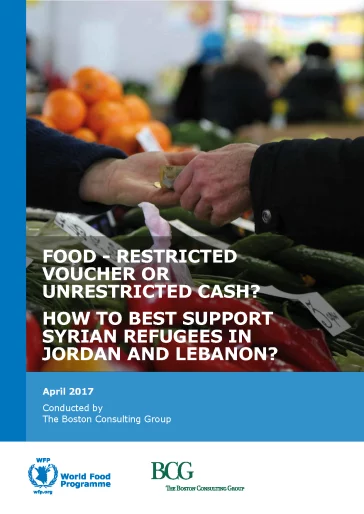
Food – Restricted Voucher or Unrestricted Voucher Cash? How to Best Support Syrian Refugees in Jordan and Lebanon?
Report
The World Food Programme (WFP) plays a pivotal role in the food security of Syrian refugees within the Syria +5 region. WFP periodically reviews its operational approach, so it is timely to consider what the best modality for the next phase of the response might be, including the pros and cons of...

Effects of Unconditional Cash Transfers on the Outcome of Treatment for Severe Acute Malnutrition (SAM): A Cluster-Randomised Trial in the Democratic Republic of the Congo
Report
Cash transfer programs (CTPs) aim to strengthen financial security for vulnerable households. This potentially enables improvements in diet, hygiene, health service access and investment in food production or income generation.The effect of CTPs on the outcome of children already severely malnourished...

Cash alone is not enough: a smarter use of cash
Guidelines and Tools
Cash based interventions (CBIs) enable crisis affected people to make choices and prioritise their own needs. They also support markets critical to survival and recovery of communities. NRC is committed to increasing the use of cash across its programmes. Yet, cash based interventions are not a...

Fitting aid to context: community experiences of aid delivery in northern Syria
Report
The ongoing conflict in Syria has left 13.5 million Syrians in need of humanitarian assistance. Several local and international organisations provide aid to northern Syria, but their chosen modalities fail to effectively meet community members’ needs. While aiming to respond to immediate short-term...

Aid in context: the importance of market-based approaches to aid delivery in northern Syria
Report
With the Syrian conflict now in its seventh year, 13.5 million Syrians need humanitarian aid. But aid in northern Syria focuses inflexibly on food kits that are expensive to administer, designed to satisfy short-term needs.
Many people sell their food aid to pay for other urgent needs. This
undermines...

Is cash better than food vouchers for Syrian refugees?
Report
A comparative analysis of the effectiveness of unrestricted cash and food restricted voucher assistance modalities for Syrian refugee households’ food security in Jordan and Lebanon.


